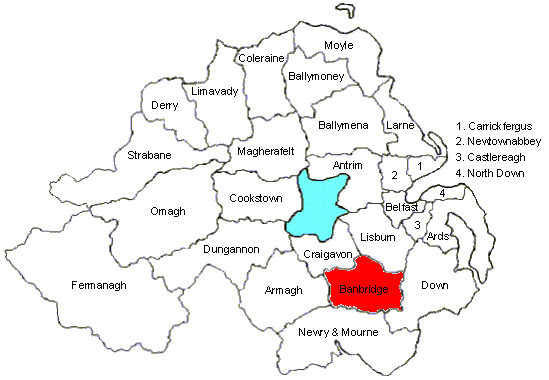Newry - In den letzten 12 Monaten wurde ein junges, nationalistisches Paar aus Banbridge regelmäßig vom britischen Geheimdienst bedroht. Der Grund ist ihre enge Freundschaft zu einem Mitglied von Republican Sinn Féin in Newry, Co. Down. Der Höhepunkt der Drohungen war eine Bombenattrappe vor ihrem Haus.
 Ein Teil des Paares wurde vom britischen Geheimdienst aufgehalten, als er auf Urlaub war. Es wurde in ihr Haus eingedrungen und dem Paar erklärt, die Loyalisten in der Umgebung würden sie nicht in Ruhe lassen, wenn sie nicht mit dem britischen Geheimdienst kooperieren würden.
Ein Teil des Paares wurde vom britischen Geheimdienst aufgehalten, als er auf Urlaub war. Es wurde in ihr Haus eingedrungen und dem Paar erklärt, die Loyalisten in der Umgebung würden sie nicht in Ruhe lassen, wenn sie nicht mit dem britischen Geheimdienst kooperieren würden.
Ihre Weigerung dies zu tun führte schließlich dazu, dass eine Bombenattrappe am Mittwochmorgen, 27. Jänner 2010, vor ihrem Haus platziert wurde. Das Haus musste durch die Hintertür verlassen werden und durfte stundenlang nicht betreten werden.
Etwa zur selben Zeit erhielt die Mutter des Bedrohten einen anonymen Telefonanruf, in dem sie gewarnt wurde, dass ihr Sohn „mitsamt seinem Haus verbrannt werden wird“.
„Dieser Vorfälle zeigt abermals, dass die britischen Geheimdienste, genauso wie Gerry Adams’ RUC, weiterhin eng mit loyalistischen Todesschwadronen verbunden sind“, so Richard Walsh, Pressesprecher von Republican Sinn Féin.
Irish Republican Correspondent, 27ú Mhi na Eanáir 2010
 Ein Teil des Paares wurde vom britischen Geheimdienst aufgehalten, als er auf Urlaub war. Es wurde in ihr Haus eingedrungen und dem Paar erklärt, die Loyalisten in der Umgebung würden sie nicht in Ruhe lassen, wenn sie nicht mit dem britischen Geheimdienst kooperieren würden.
Ein Teil des Paares wurde vom britischen Geheimdienst aufgehalten, als er auf Urlaub war. Es wurde in ihr Haus eingedrungen und dem Paar erklärt, die Loyalisten in der Umgebung würden sie nicht in Ruhe lassen, wenn sie nicht mit dem britischen Geheimdienst kooperieren würden.Ihre Weigerung dies zu tun führte schließlich dazu, dass eine Bombenattrappe am Mittwochmorgen, 27. Jänner 2010, vor ihrem Haus platziert wurde. Das Haus musste durch die Hintertür verlassen werden und durfte stundenlang nicht betreten werden.
Etwa zur selben Zeit erhielt die Mutter des Bedrohten einen anonymen Telefonanruf, in dem sie gewarnt wurde, dass ihr Sohn „mitsamt seinem Haus verbrannt werden wird“.
„Dieser Vorfälle zeigt abermals, dass die britischen Geheimdienste, genauso wie Gerry Adams’ RUC, weiterhin eng mit loyalistischen Todesschwadronen verbunden sind“, so Richard Walsh, Pressesprecher von Republican Sinn Féin.
Irish Republican Correspondent, 27ú Mhi na Eanáir 2010









